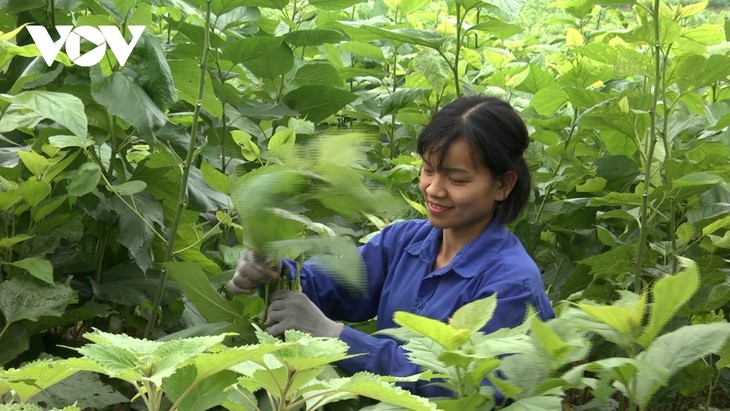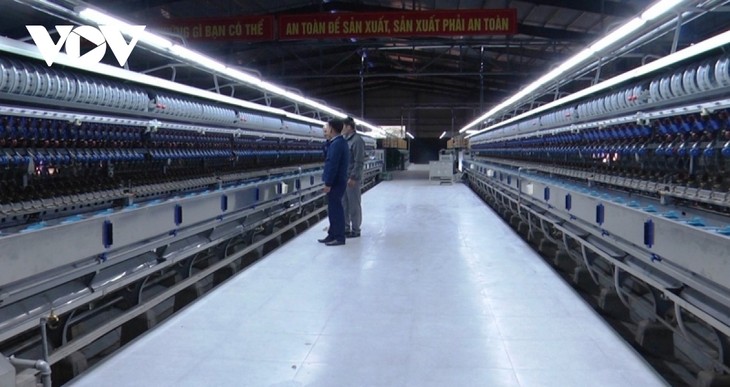(VOVWORLD) - Growing mulberry trees and raising silkworms has given people in Tran Yen mountain district, Yen Bai province, an income three to four times higher than growing wet rice and other crops. Some families now earn thousands of dollars a year, and the standard of living in new-style rural communes there improves day by day.
 Bao Dap farmers feel more confident as sericulture produces higher economic efficiency. Bao Dap farmers feel more confident as sericulture produces higher economic efficiency. |
Right after this year's first mulberry crop, Tran Thi Hoan of Ngoi Hop hamlet began preparing for the next crop. 70-year-old Hoan and her husband have approximately 3,000 square meters of mulberry trees.
She says they needed very little initial investment, and the work is not too hard, so it’s suitable for older people like her. They earn about 3,000 USD a year growing mulberries and raising silkworms.
Hoan told VOV, “Raising silkworms has improved my family's income. We don’t have to depend on our children. And if the commune needs money to build a community house or road, we have enough money to contribute.”
Nguyen Thi Dung’s family in Dong Buoi hamlet has engaged in sericulture for a decade and has converted all their unprofitable land to mulberries and silkworms. Their 5,000 square meters of land produces about 80 kilos of cocoons per month. At the current price of 6.4 USD a kilo, her family earns more than 510 USD per month.
Nguyen Thi Thao’s family has just begun doing sericulture. To limit their risk and ensure a stable income, her family joined a local cooperative.
Thao recalled initially she produced two baskets of silkworms with the support of other co-op members.
“When some of the silkworms got a disease, the members of the co-op came to help us because we were inexperienced. The price of cocoons sometimes reaches 8 USD a kilo. Then our income is quite good,” Thao went on to say.
Bao Dap commune has nearly 150 hectares of mulberry trees, 130 hectares of which are in harvest. Last year the silkworms produced 210 tons of cocoons, earning more than 850,000 USD.
The commune intends to expand its mulberry-growing area and the local administration is looking for a stable outlet for their production, said Ngo Thi Thuy Van, Chairwoman of the communal Farmers’ Association.
“Before we connected with each other, local farmers raised silkworms and then tried to find traders to buy their cocoons,” said Van, adding, “Last year an automated silk filament extraction factory was built in Bao Dap commune, bolstering the farmers’ confidence they will have an outlet.”
Van says the factory, managed by the Yen Bai Sericulture Joint Stock Company, was put into operation in March and has a capacity of 150 tons of silk a year, equivalent to 1,100 tons of cocoons. Its silk is exported to India, Japan, and the EU.
 Yen Bai Sericulture Joint Stock Company plans to buy 1,000 tons of cocoons in 2023. Yen Bai Sericulture Joint Stock Company plans to buy 1,000 tons of cocoons in 2023. |
Dinh Xuan Truong, Director of the Company, says his company has pledged to buy all the cocoons produced by the communes in Tran Yen district and neighboring localities.
It intends to buy 1,000 tons of cocoons this year. This makes local mulberry and silkworm producers feel a lot more secure.
“We’re committed to purchasing and grading the local production. If any cocoons are below our standard, we’ll send our engineers to show the farmers how to improve the quality of their cocoons. This linkage will help farmers grow better products more efficiently and give our customers higher quality silk to export,” said Truong.
Each hectare of mulberry trees produces an income of 8,500 USD, two to three times more than other crops.
Other communes in Tran Yen district have now established mulberry and silkworm cooperatives, and formed links between farmers and traders.